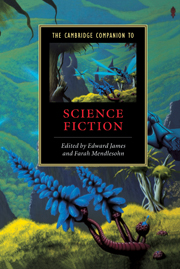Book contents
- Frontmatter
- Introduction
- Part 1 The history
- 1 Science fiction before the genre
- 2 The magazine era: 1926–1960
- 3 New Wave and backwash: 1960–1980
- 4 Science fiction from 1980 to the present
- 5 Film and television
- 6 Science fiction and its editors
- Part 2 Critical approaches
- Part 3 Sub-genres and themes
- Further Reading
- Index
- Series List
1 - Science fiction before the genre
from Part 1 - The history
Published online by Cambridge University Press: 28 May 2006
- Frontmatter
- Introduction
- Part 1 The history
- 1 Science fiction before the genre
- 2 The magazine era: 1926–1960
- 3 New Wave and backwash: 1960–1980
- 4 Science fiction from 1980 to the present
- 5 Film and television
- 6 Science fiction and its editors
- Part 2 Critical approaches
- Part 3 Sub-genres and themes
- Further Reading
- Index
- Series List
Summary
The origins of science fiction
The word 'science' acquired its modern meaning when it took aboard the realization that reliable knowledge is rooted in the evidence of the senses, carefully sifted by deductive reasoning and the experimental testing of generalizations. In the seventeenth century writers began producing speculative fictions about new discoveries and technologies that the application of scientific method might bring about, the earliest examples being accommodated - rather uncomfortably - within existing genres and narrative frameworks.
One genre hospitable to sf speculation was that of utopian fantasy, whose usual narrative form was the imaginary voyage. The rich tradition of sf travellers' tales was launched by one of the first and foremost champions of the scientific method, Francis Bacon, in New Atlantis (written c.1617; published 1627), although the importance of technological progress to social reform had earlier been recognised by Johann Valentin Andreae's account of Christianopolis (1619) and Tommaso Campanella's description of La Città del Sole (The City of the Sun, written 1602; published 1623). Most subsequent utopian fantasies took scientific and technological advancement into account, but relegated it to a minor role while matters of social, religious and political reform remained centre stage. Nor were those writers who took account of scientific progress always enthusiastic about it; Baconian optimism prompted a backlash of hostility from those who perceived a threat to religious values in the secularizing tendencies of religion and the materialistic encouragements of technology.
- Type
- Chapter
- Information
- The Cambridge Companion to Science Fiction , pp. 15 - 31Publisher: Cambridge University PressPrint publication year: 2003
- 11
- Cited by



